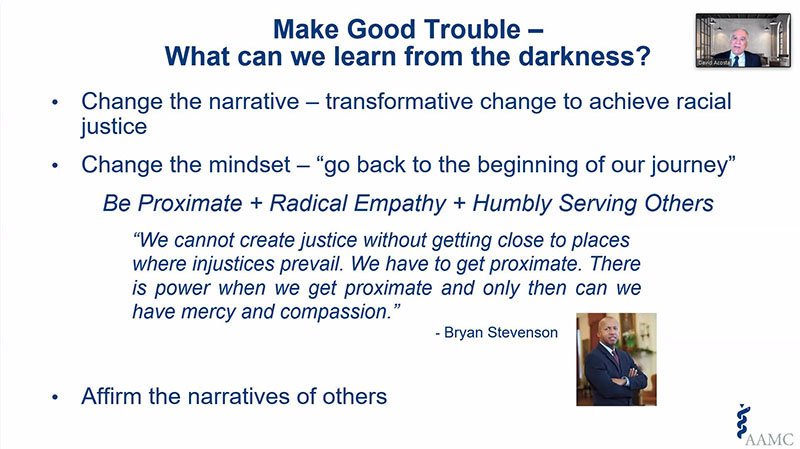There is a need to ensure that health care professionals have the skills and knowledge to provide culturally appropriate services in order to respond to the changing patient demographics, address health care disparities, ensure patient safety and the highest quality of care.
Members of the Colleges of Public Health, of Medicine, and of Nursing have come together annually to foster conversation and education around issues of cultural sensitivity and responsiveness in health care as well as the ongoing discussions of diversity, equity, and inclusion (DEI) across the institution. Read our posts about previous Culturally Responsive Health Care conferences.
The following is a summary of this year’s conference by course director, Poorani Sekar, MD, clinical assistant professor in the Division of Infectious Diseases.
Due to the pandemic, our annual conference was cancelled in 2020. This year, in light of the national conversation and controversy surrounding conducting certain kinds of DEI training at educational institutions, I wanted to be very intentional in the topics we chose and the speakers we invited for our conference this year. There are definitely disparities and inequities in health care and, there are groups of people who are disproportionately affected by these inequities as evidenced by the COVID -19 pandemic. The last year has also shown the heartbreaking social injustices committed against people of color which can only be prevented by more education and open conversations.
We decided to invite David Acosta, MD, Chief Diversity and Inclusion Officer for the Association of American Medical Colleges (AAMC), to give our first keynote address on this very topic – on why it is important to continue DEI work in academia. Following this, we invited Denise Martinez, MD; Lastascia Coleman, ARNP; and Derek Willis, MPA, who are on various DEI task forces here at University of Iowa Health Care (with Gerard Clancy, MD, as moderator) to discuss ongoing DEI initiatives in the hopes that we may all be part of the conversation on best practices for healthcare institutions and also in the hopes that our audience may use this as a point of reference to start their own DEI ventures at their home institutions. In keeping with this theme, we had Kanya Ferguson, MD, talk about the pilot program here providing culturally inclusive skin and hair products to our patients, which stemmed from a patient’s request for a wide-toothed comb during her hospital stay (and none was found in the hospital). I am honored to be part of that committee and work closely with Dr. Ferguson and the rest of the committee.
We care for patients from different backgrounds and with different health struggles, and one overwhelming theme is that these patients want to be treated with dignity and respect, as we would want to be treated ourselves. To that end, we had two workshops; the first one was by Jessica Brierton, MSW, on caring for patients who are transgender and on the correct use of pronouns. The next workshop by Matthew O’Brien, PhD, and Todd Kopelman, PhD, was on caring for patients with autism. Patient Abby N. graciously attended the workshop and discussed her life with a diagnosis of autism. She provided us a lot of insight into her life, and the takeaway from this workshop was never to assume things of our patients or their abilities. Each patient is unique and should be treated as such.
In this year we would be remiss if we didn’t talk about the unique challenges we have faced during the COVID-19 pandemic. Assistant professor at University of Nebraska Medical Center Jasmine Marcelin, MD, was our second keynote speaker. She spoke about the COVID-19 pandemic as a national emergency, discussing how this illness disproportionately affected people of color. This particular line from her talk resonated with me: “COVID is not racist.” It is inequities and disparities and systemic racism in medicine that have led to disproportionately severe illness and hospitalizations and deaths in people of color. We do need to talk about these factors and educate people to mitigate these moving forward. We had a panel discussion following this talk with Martha Carvour, MD, PhD, and her mentee Hannah Zedeh talking about COVID-19 in Iowa and how this illness disproportionately affected people of color working in meat-packing plants as a specific example. Patient Stacy Brand then very courageously described her experience with being hospitalized in the ICU with COVID-19 and her experience as a patient with a disability and being in the hospital without the support of her family members. She gave us a simple yet very important piece of advice to us: “Always listen to your patient!”
Finally we had a panel discussion on the unique health needs of the thousands of patients who have been affected with COVID and who continue to have symptoms long after they have recovered from their acute illness. I believe we will all see patients with long haul COVID in the upcoming years, and it is important to know about this syndrome and not be dismissive of their symptoms.
I would like to thank Lama Noureddine, MD, for co-chairing this conference with me. Thanks also to Lori Raw and Janet Niebuhr for organizing everything. Without them this conference would not have been possible. Finally, thanks to the CRC conference committee for all their help and input into planning the conference.
In the current time of social injustices, inequities, and disparities I truly believe that education and open conversations are the only way forward. In the words of national poet laureate Amanda Gorman:
When day comes, we step out of the shade,
“The Hill We Climb” by Amanda Gorman, National Youth Poet Laureate
aflame and unafraid
The new dawn blooms as we free it.
For there is always light,
if only we’re brave enough to see it
If only we’re brave enough to be it





















